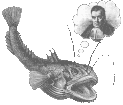UW Aquatic & Fishery Sciences Quantitative Seminar
Merrill Rudd
School of Aquatic and Fishery Sciences
Does unreported catch lead to overfishing?
Abstract
It is generally believed that unreported catch has a negative impact on fish stock status and management. While unreported catch certainly obscures our understanding of a fishery’s dynamics, this study examines its impact on our ability to estimate stock status and sustainable catch limits. We conducted a simulation study that generated an abundance index and catch time series from a “true” population, and then estimated the population’s carrying capacity and maximum sustainable yield (MSY) using a Pella-Tomlinson surplus production model. We compared results between four scenarios of catch misreporting: constant under-reporting, increasing reporting rate, decreasing reporting rate, and constant over-reporting (to represent an over-estimated reconstructed catch). For all scenarios of catch under-reporting, we under-estimated carrying capacity, population size, and MSY on average. Alternatively, over-estimating reconstructed catch led to over-estimates of MSY. These results suggest that a manager blind to under-reported catch would likely recommend more conservative harvest limits on average. These results are only applicable to total allowable catch-based management where both catch and an abundance index are available. However, our findings are important in light of recent catch reconstructions. If catch is over-estimated, this could lead to thinking the population is doing better than it really is, and recommending harvest limits greater than would be sustainable.

